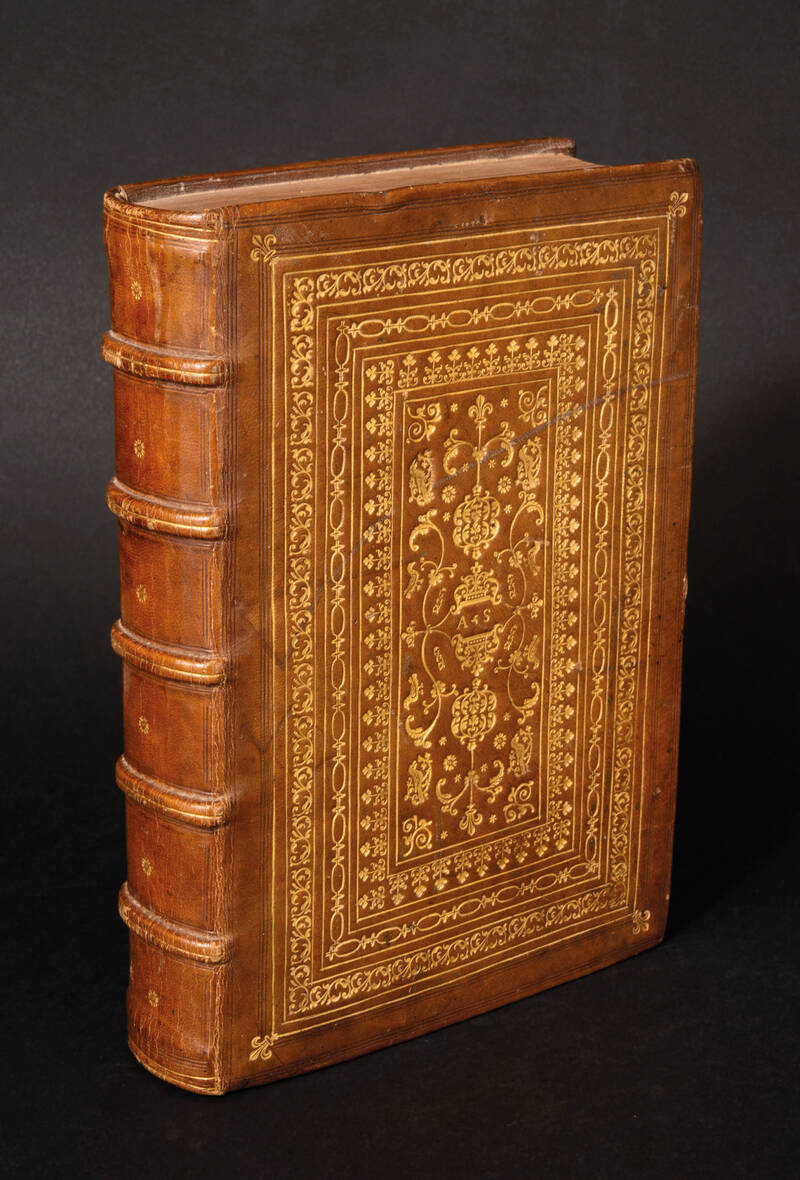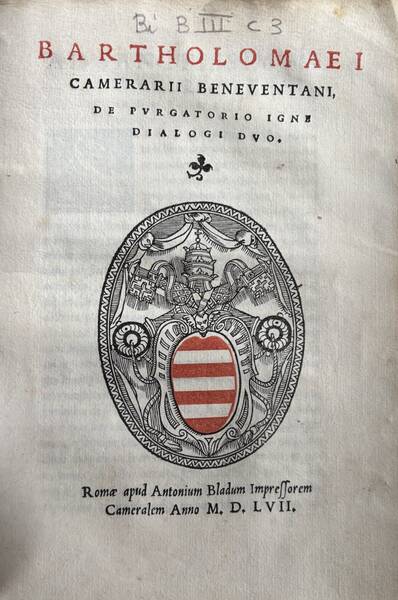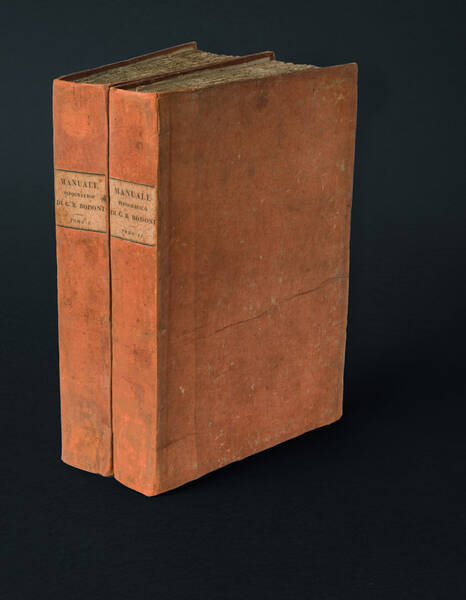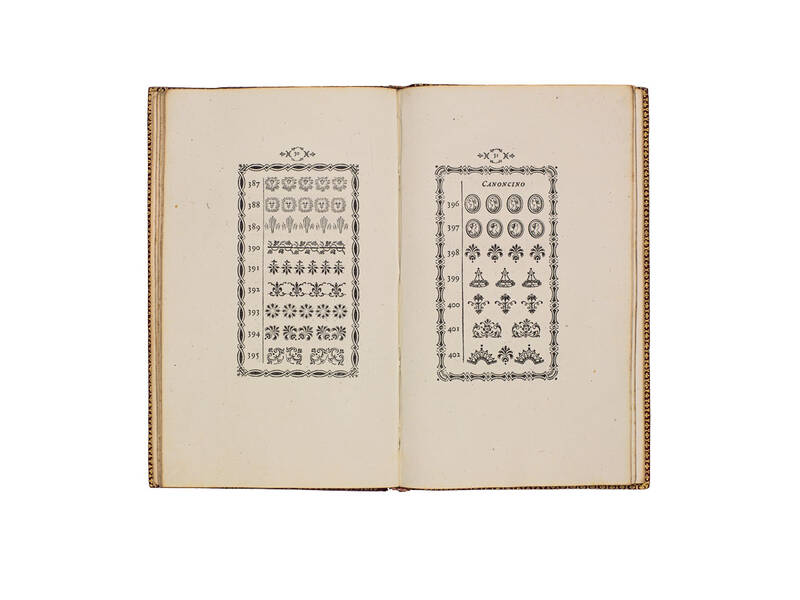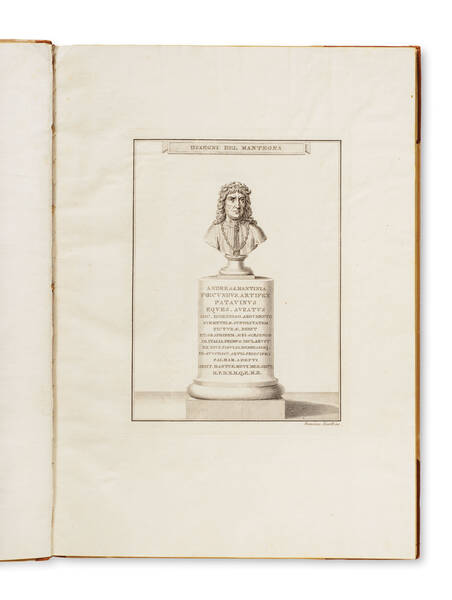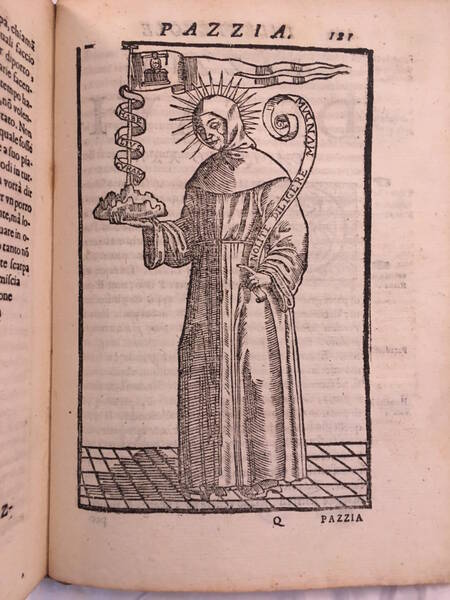LIVIUS, Titus. Le deche di T. Liuio padouano delle historie romane, tradotte nella lingua toscana, da Iacopo Nardi cittadino fiorentino, & nuouamente dal medesimo riuedute & emendate, con le postille parimente accresciute nelle margini del libro, che dichiarano molti uocaboli delle cose uecchie, piu degne di cognitione: & molti nomi di paesi, & citta, fiumi, monti, & luoghi, illustrati co nomi moderni. Etappresso, la ualuta delle monete romane, ridotta al pregio di quelle de tempi nostri: insieme con la dichiaratione di tutte le misure, quanto è stato necessario alla piena intelligenza dell'autore.
Venice, heirs of Lucantonio Giunta., 1547.Folio (314 x 213mm.), woodcut printer's device on title-page and final verso, woodcut initials, with blank leaf 3/6, F8v with a printed line of text pasted to foot of leaf (text which was omitted in the printing).Front flyleaf and title-page wormed, small stain on 3N4-5, lacking 4 pairs of ties, a few very small wormholes in foot of spine, overall a very fine copy in contemporary tan morocco elaborately gilt with initials A.S. in centre of covers, central panel of leafy tools and bird stamps surrounded by concentric decorative rectangles with a fleur-de-lys at each corner of the outer border, spine with small floral stamp in each compartment and a single gilt fillet across each support, gilt edges, in modern drop-backed folding box.
Ab urbe condita libri (Books from the Founding of the City), is a monumental history of Rome, the most important history of ancient Rome. The work covers the period from the legends concerning the arrival of Aeneas and the refugees from the fall of Troy, to the city's founding in 753 BC, the expulsion of the Kings in 509 BC, and up to Livy's own time, during the reign of the emperor Augustus. The last event covered by Livy is the death of Drusus in 9 BC. A quarter of the work, 35 of 142 books, is still extant. The surviving books deal with events down through 293 BC (books 1–10), and from 219 to 166 BC (books 21–45). Livy's latin text of was translated into Italian by the famous Florentine historian Jacopo Nardi. “Jacopo Nardi, (born 21 July 1476, Florence [Italy]—died after 1563, Venice), Florentine statesman and historian who wrote a history of Florence that sharply criticized the ruling Medici family. Nardi was born to a family that was long hostile to the Medici. He followed a military career until the expulsion of the Medici in 1494; he then served in several posts as a magistrate and became one of the principal republican partisans of Girolamo Savonarola, the religious reformer who virtually ruled Florence from 1494 until 1498. When the Medici returned in 1512, Nardi continued to occupy several minor posts. With the final fall of the Florentine republic (1530–31), he was exiled and his property confiscated. Nardi spent the rest of his life in Venice, wrote to support his family, and represented the Florentine exiles in 1535 when they made a formal accusation against Alessandro de'Medici before the Holy Roman emperor Charles V. Nardi is best known for his Istorie della citta' di Firenze (1582; “History of the City of Florence”), which covers the period 1494–1538 and is a valuable discussion of Florentine politics during the time of Savonarola and the republic. He also wrote two comedies in verse, L'amicizia (1503–12; “Friendship”) and I due felici rivali (before 1519; “Two Happy Rivals”), and translated several classics”. (Britannica on-line). A fine crisp copy in a handsome contemporary binding. Davis Gift 53 (printed in Rome, 1549) has a binding with the same outer border, also with the initials A.S. within the same pair of stamps. The Davis Gift catalogue is ambivalent about the country of origin of the binding, but states that A.R.A. Hobson thought it to be French. The same border tools are present on the binding, described as Roman, published by De Marinis, I, pl. CXLIII (Venice 1547).
Edit16 26894.
Other Books
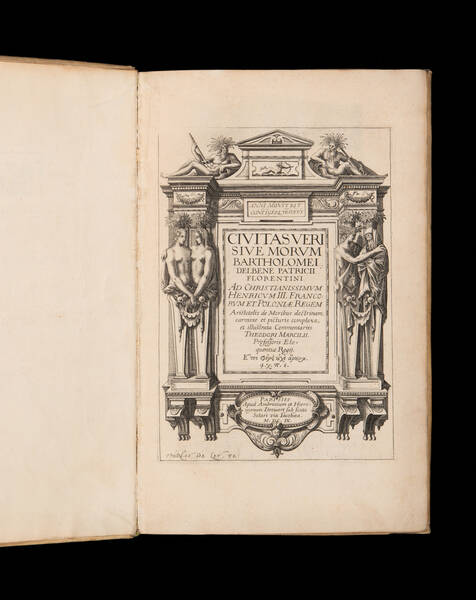
DEL BENE, Bartolommeo
Civitas veri sive morum ... illustrata commentariis Theodori Marcilii.
€ 19.000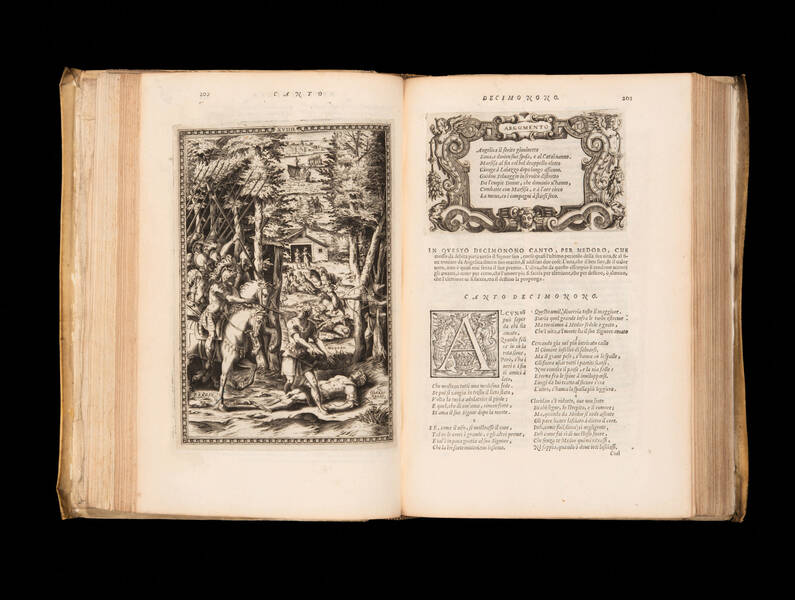
ARIOSTO, Ludovico
Orlando furioso di m. Lodouico Ariosto nuouamente adornato di figure di rame da Girolamo Porro padouano et di altre cose che saranno notate nella...
SOLD OUT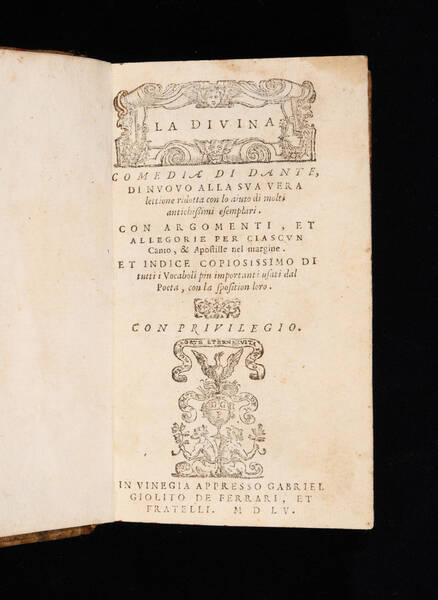
ALIGHIERI, DANTE
La Divina Comedia Di Dante, di nuouo alla sua vera lettione ridotta con loaiuto di molti antichissimi esemplari. Con argomenti, et allegorie per...
SOLD OUT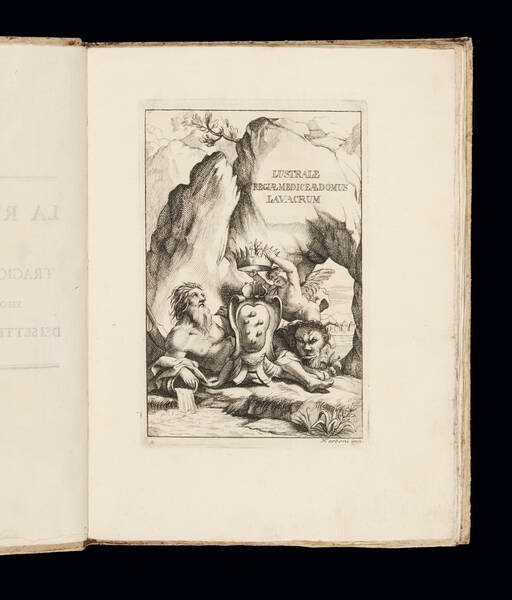
CATANI, Francesco Saverino
La reale medicide, esponente nella morte di Don Garzia i fatti più speciali di Cosimo Duca II. di Firenze ... Tragica festa teatrale, illustrata di...
€ 3.000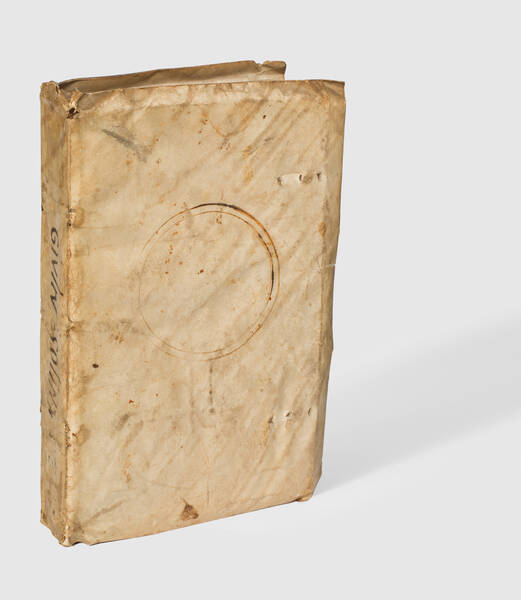
POMPONIUS MELA, IULIUS SOLINUS
Itinerarium Antonini Aug. Vibius Sequester. P. Victor de regionibus urbis Romae. Dionysius Afer de Situ orbis Prisciano interprete
SOLD OUT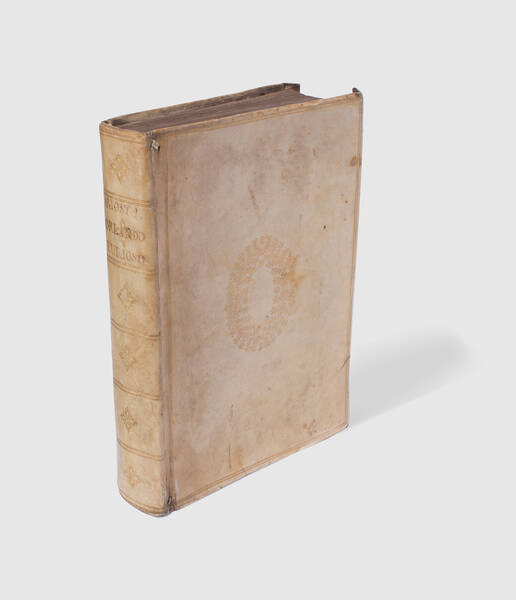
ARIOSTO, Ludovico
Orlando furioso di m. Lodouico Ariosto nuouamente adornato di figure di rame da Girolamo Porro padouano et di altre cose che saranno notate nella...
SOLD OUT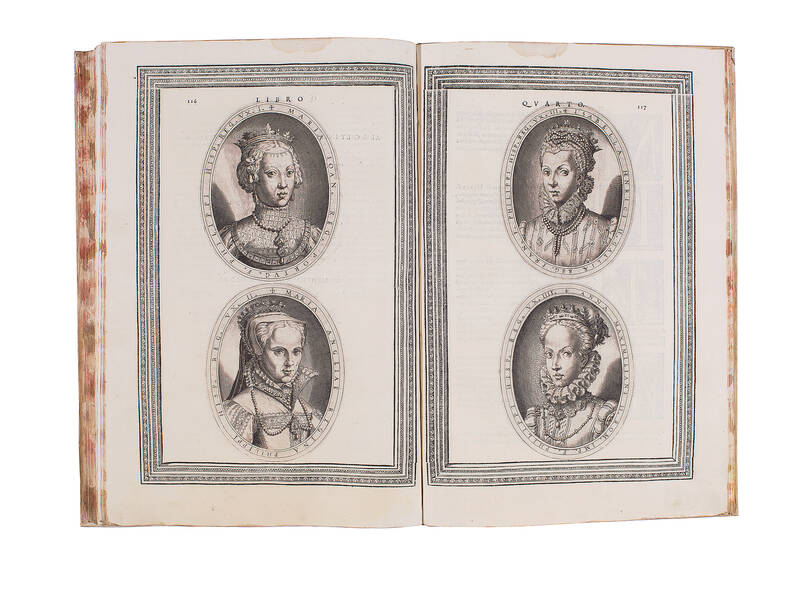
CAMPO, Antonio
Cremona fedelissima città et nobilissima colonia de romani rappresentata in disegno col suo contado et illustrata d'vna breue historia delle cose piu...
€ 15.000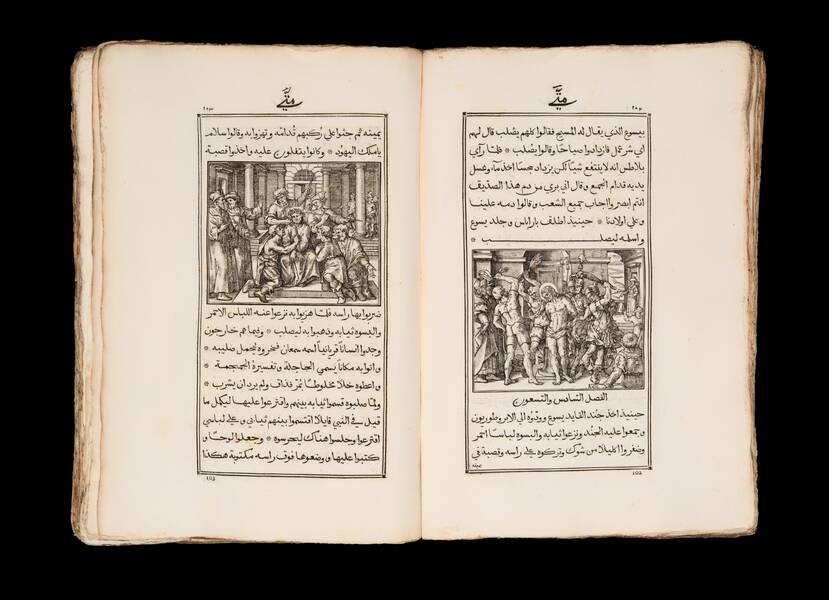
[BIBLIA ARABICA]
Evangelium Sanctum Domini nostri Iesu Christi conscriptum a quatuor Evangelistis sanctis, id est Matthaeo, Marco, Luca et Iohanne.
SOLD OUT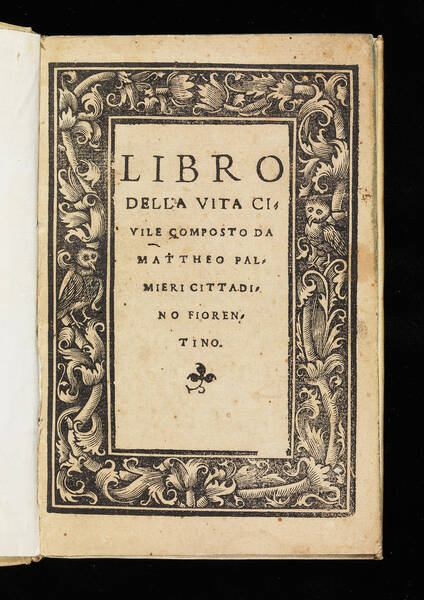
PALMIERI, Matteo
Libro della vita civile composta da Mattheo Palmieri cittadino fiorentino.
SOLD OUT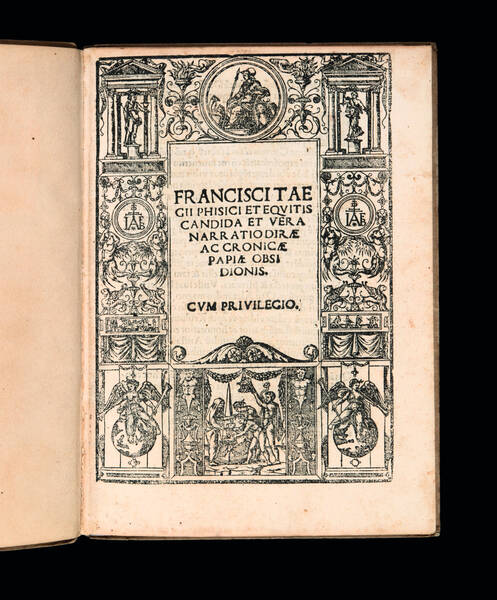
TAEGIO, Francesco
Frencisci Taegii phisici et equitis Candida et vera narratio dirae ac cronicae Papiae obsidionis.
€ 30.000![Trattato della natura de’ cibi et del bere [...] nel quale non solo tutte le virtù, & i vitij di quelli minutamente si palesano; ma anco i rimedij per correggere i loro difetti copiosamente s’insegnano. Trattato della natura de’ cibi et del bere [...] nel quale non solo tutte le virtù, & i vitij di quelli minutamente si palesano; ma anco i rimedij per correggere i loro difetti copiosamente s’insegnano.](https://www.medariquier.com/typo3temp/pics/d4e0248596.jpeg)
PISANELLI, Baldassarre
Trattato della natura de’ cibi et del bere [...] nel quale non solo tutte le virtù, & i vitij di quelli minutamente si palesano; ma anco i rimedij...
€ 9.500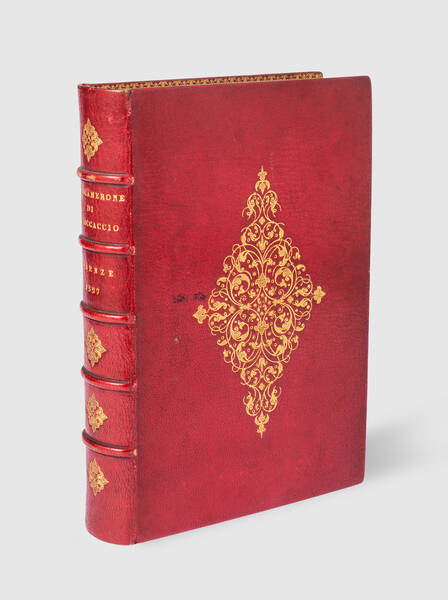
BOCCACCIO, Giovanni
Il Decamerone di m. Giouanni Boccaccio nuouamente corretto et con diligentia stampato.
SOLD OUTMEDA RIQUIER rare books ltd.
4 Bury Street St James's
SW1Y 6AB London
Phone +44 (0) 7770457377
info@medariquier.com
